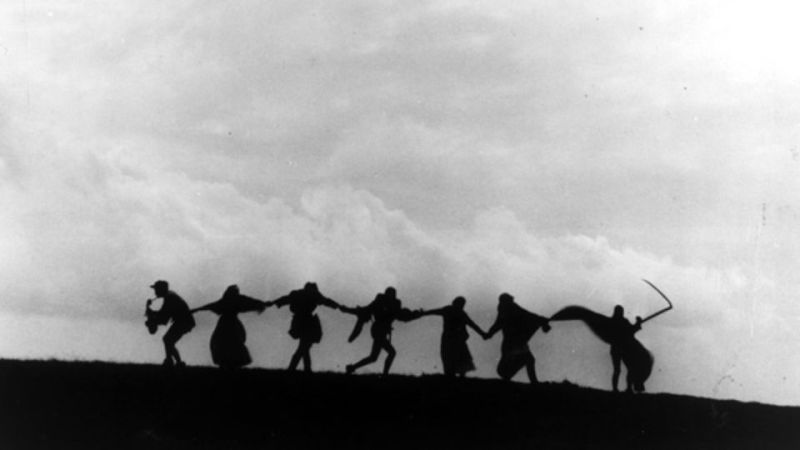Film is an artistic medium I have always been drawn to, a personal intrigue thatultimately convinced me to join a drama program and fuelled my desire to work in the film industry. With that regard, I am always interested to watch something unique, whether it is from this century orthe last, and dissect it in the most intimate way possible if it happens to earn my respect. I didn’t know what to expect before viewing The Seventh Seal in all its metaphysical glory, but it would be impossible to deny the true genius found within every frame and second of Antonius Block’s insatiable quest for God. It enraptured me, to view a world so utterly destroyed by an incurable disease and how desperation can drive people to extreme measures in order to find “salvation”.
The agonizing cries of the flagellators overpowers the joyful sounds of the troupe’s performance, reminding the viewer that the land is filled with nothing but Death, for he holds the fate of everyone. I immediately thought back to my English course, the idea of existentialism and the futility of life instantly connected the dots I didn’t see before. This film was made in the nineteen fifty’s, a time when Death was very apparent and a very real threat in the form of the atomic bomb. This concept would stay etched in my memory, and helped me understand exactly where Ingmar Bergman’s thoughts were coming from. Now knowing this futility and feeling of hopelessness so heavily demonstrated in the unflinching face of the personified Death, it wasn’t hard to guess that the characters journeying with the faithful Block would be doomed to die in the end. If they had escaped Death, then Bergman’s point would have been diluted, for his message is simply that death is inevitable. A chess game must end, it cannot continue forever, and Block’s attempts at buying time for himself earned him no answers, and only plunged him further into his uncertainty of ever obtaining proof of God. This blasphemous wish the Crusader has that his squire Jὂns is unable to thwart, only seals his fate further, for it is the belief of Christianity that you must only have faith in God, not knowledge which is to be taken as a sin. Block’s desire to have proof of God before he dies represents humanity and a question every individual has asked themselves at one point in their lives. We as humans wish to know things beyond our understanding, including the meaning of life, and when Block begins to slowly learn that there is perhaps no meaning to life, he seems almost at a loss of what to do next. However in a final act of redemption by purposely losing his chess game with Death, Block believes that maybe his soul will be saved after sparing something so pure which is the beautiful family of Jof and Mia from Death’s crushing hold. In Bergman’s mind however, this is meaningless, a simple act of selflessness does not call to an entity that will save a person’s soul from the eternity of Death, especially when such a savior does not exist. The final scene at the end of the film where Block and his companions are performing a danse macabre shows death’s finality, for they are bound to it and almost succumb to its hold.
Bergman’s genius is in his story- telling, the imagery used to represent his own inner turmoil, engraves itself on the mind, for it is heavy content that is an allegory for reality. I may not necessarily agree with Bergman’s beliefs, but it would be an utter lie to say that the Seventh Seal did not make me question what I hold in my heart to be true about the world. If there is one thing I learned, it is this: Death is one exceptional dancer, and eventually one day we will join him, unable to escape his music.

